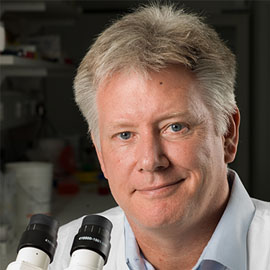A cancer immunologist who as of 2017 was “the most highly cited immunologist in Australia” has “seriously breached Codes relating to responsible research conduct,” according to his former employer.
QIMR Berghofer in Brisbane “has commissioned an independent external investigation after a number of complaints relating to the research conduct of a former employee Professor Mark Smyth,” the institute said in a statement.
The external investigation, led by a retired appeals court judge, Robert Gotterson, followed a preliminary investigation, according to QIMR Berghofer, which said it “has referred the findings to the Crime and Corruption Commission in accordance with its legislative obligations.” The institute has “also organised for an independent review into a broad range of issues arising out of the Panel Report” that will be conducted by former federal court judge Bruce Lander.
The statement does not specify what Smyth did to breach the research code.
Smyth resigned from QIMR Berghofer in August of this year. In an email then to faculty and staff, Fabienne Mackay, director and CEO of the institution, noted that Smyth had led a “large and significant research program” for more than eight years, and “strongly promoted the careers of many earlier career scientists.”
The immunologist earned what we called a mega-correction in 2015, and a retraction in 2006.
Smyth was elected to the Australian Academy of Science in 2017. In 2020, he was appointed to the scientific advisory board of Shanghai-based EpimAb Biotherapeutics.
He could not be immediately reached for comment.
Like Retraction Watch? You can make a one-time tax-deductible contribution by PayPal or by Square, or a monthly tax-deductible donation by Paypal to support our work, follow us on Twitter, like us on Facebook, add us to your RSS reader, or subscribe to our daily digest. If you find a retraction that’s not in our database, you can let us know here. For comments or feedback, email us at [email protected].

QMIR or QIMR? Both occur in the article.
Fixed, thanks.
“The above article published online on 27 September 2019 in Wiley Online Library (wileyonlinelibrary.com) has been retracted by agreement between the journal’s Editor-in-Chief, Rajiv Khanna, the Australian and New Zealand Society for Immunology Inc., and John Wiley and Sons Australia, Ltd. The retraction has been agreed following an investigation by the QIMR Berghofer Medical Research Institute into research published by the senior author, Professor Mark J Smyth. The investigation concluded that at least two figures (3b and 4b) generated by the senior author Professor Mark Smyth are likely fabricated. As a result, the conclusions are considered unreliable, and the article has been retracted.”
https://onlinelibrary.wiley.com/doi/10.1002/cti2.1378
“CD155 loss enhances tumor suppression via combined host and tumor-intrinsic mechanisms”. Retracted 15 March 2022.
“QIMR Berghofer Medical Research Institute recently notified the JCI of concerns regarding Figures 4I and 7A and indicated that an independent panel investigation concluded that these figures contain data fabricated by Mark Smyth. In accordance with the institutional recommendation, the JCI is retracting this article.
Amelia Roman Aguilera, Matthias Braun, Ailin Lepletier, and Kyohei Nakamura have agreed with the Journal’s decision to retract the paper. The remaining authors abstained from commenting or could not be reached.”
Turns out he was also a bully who was protected by QIMR for 7 years
https://www.brisbanetimes.com.au/national/queensland/top-research-institute-had-seven-years-to-act-on-misconduct-complaints-20230509-p5d6w5.html
11th August Retraction for Mark J Smyth in J Clin Oncol.
https://ascopubs.org/doi/10.1200/JCO.23.01358
External investigation committee members found:
“unlikely that the experiments shown in Figure 2 were actually performed”
Blood Oct 4th 2023 notice:
Takeda K, Cretney E, Hayakawa Y, Ota T, Akiba H, Ogasawara K, Yagita H, Kinoshita K, Okumura K, Smyth MJ. TRAIL identifies immature natural killer cells in newborn mice and adult mouse liver. Blood. 2005;105(5):2082-2089.
The Editors of Blood retract the 1 March 2005 paper cited above. Concerns regarding the duplication of several outlying data points in Figure 4 were brought to the journal’s attention. A search for original source data was unsuccessful. As a result, the data underlying this figure cannot be validated, and the paper has been retracted.
Yoshihiro Hayakawa, Kouetsu Ogasawara, Ko Okumura, Kazuyoshi Takeda, and Hideo Yagita approve the retraction. No response was received from Hisaya Akiba, Erika Cretney, Katsuyuki Kinoshita, Tsuyoshi Ota, or Mark J. Smyth.
https://doi.org/10.1182/blood.2023XXXXXX
© 2023 by The American Society of Hematology
An amazing investigation by Liam Mannix of The Age Australia has uncovered how Mark was able to evade punishment for so long. Junior scientists sacrificed at the alter of money and appearance by two of Australias premier research institutes….
https://www.theage.com.au/national/the-cancer-drug-the-faked-data-and-the-superstar-scientist-20250710-p5mdxa.html
https://www.theage.com.au/national/follow-the-mice-how-whistleblowers-secret-lab-videos-brought-down-top-scientist-20250710-p5mdxc.html